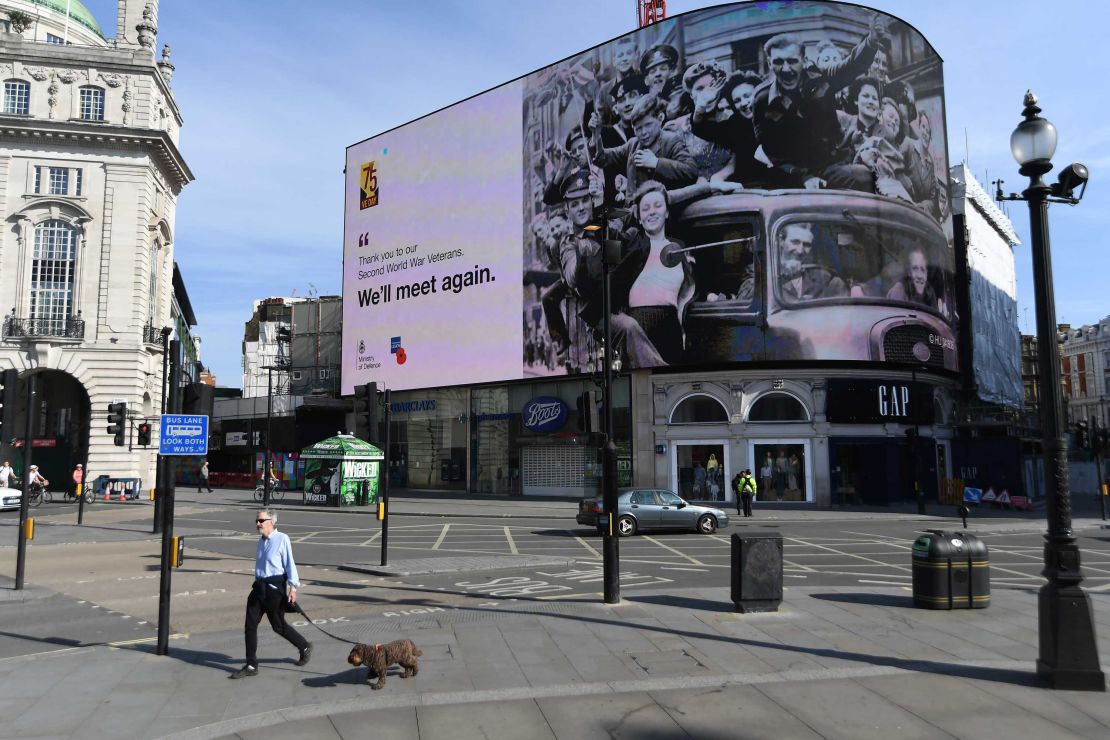Queen Elizabeth II has likened the British public’s response to the coronavirus pandemic with the efforts of its soldiers during World War II, in a televised speech delivered exactly 75 years after her father marked the end of fighting in Europe.
Speaking on the 75th anniversary of VE Day, the Queen remembered her own experiences of the end of fighting on the continent and praised the “strength and courage” of British and Allied troops who brought about Germany’s surrender on May 8, 1945.
“Never give up, never despair – that was the message of VE Day,” the monarch said. “I vividly remember the jubilant scenes my sister and I witnessed with our parents and Winston Churchill from the balcony of Buckingham Palace.”
Acknowledging the impact on modern British life of the coronavirus pandemic, which has forced this year’s public commemorations to be canceled, she also drew parallels between the UK’s wartime generation and their modern compatriots.
Related coverage
“Today it may seem hard that we cannot mark this special anniversary as we would wish. Instead we remember from our homes and our doorsteps,” she said at the conclusion of her speech. “But our streets are not empty; they are filled with the love and the care that we have for each other.
“When I look at our country today, and see what we are willing to do to protect and support one another, I say with pride that we are still a nation those brave soldiers, sailors and airmen would recognize and admire,” the Queen added.
The monarch’s message was broadcast 75 years to the minute after her father, King George VI, gave a radio address to the country in which he praised a “great deliverance” and announced that “Germany, the enemy who drove all Europe into war, has been finally overcome.”
On 8 May 1945, Prime Minister Winston Churchill also announced to the British nation that the Germans had “signed the act of unconditional surrender.” Churchill concluded his speech by saying: “Advance Britannia, long live the cause of freedom, God save the King.” On this day – VE Day – Buckingham Palace was a focal point of the celebrations.
“At the start, the outlook seemed bleak, the end distant, the outcome uncertain,” the Queen said on Friday, thanking the UK, the Commonwealth and other Allied nations for their efforts. “But we kept faith that the cause was right – and this belief, as my father noted in his broadcast, carried us through.”
The speech marked the second time the 94-year-old monarch has addressed the country since the coronavirus outbreak began – usually a rare occurrence saved only for her annual Christmas Day message.

It comes as Prime Minister Boris Johnson prepares to announce the country’s plan to tentatively emerge from its lockdown in a separate televised speech on Sunday. Those restrictions, more draconian than any curbs on British life seen since World War II, have left VE Day celebrations around the world significantly muted and forced planned public gatherings in London and other cities to be scrapped.
The Queen recalled far more jubilant scenes 75 years ago. “The sense of joy in the crowds who gathered outside and across the country was profound,” she said.
Elizabeth, then a 19-year-old monarch in waiting, celebrated with her family and Churchill at Buckingham Palace before slipping out with her sister, Princess Margaret, to join celebrating crowds in London in 1945.
“I remember lines of unknown people linking arms and walking down Whitehall, all of us just swept along on a tide of happiness and relief,” she recalled of the day in a 1985 clip re-shared by the royal family earlier on Friday. “After crossing Green Park, we stood outside and shouted, ‘We want The King!’ and we were successful in seeing my parents on the balcony … I think it was one of the most memorable nights of my life.”
Earlier on Friday, much of the country observed two minutes of silence, and Johnson tweeted that the nation’s gratitude to those who fought in the war will be “eternal.” The Red Arrows display team conducted a flyover in London.
About 70 million people fought in the armed forces of the Allied and Axis nations during World War II, with estimates of total fatalities ranging from 40 to 85 million.
VE Day marked the moment that Germany officially surrendered, ending fighting in the European theater. Conflict continued in Asia and the Pacific until the Japanese surrender on August 15.
“The wartime generation knew that the best way to honor those who did not come back from the war, was to ensure that it didn’t happen again,” the Queen said in her Friday speech. “The greatest tribute to their sacrifice is that countries who were once sworn enemies are now friends, working side by side for the peace, health and prosperity of us all.”
CNN’s Hilary McGann contributed to this report.

